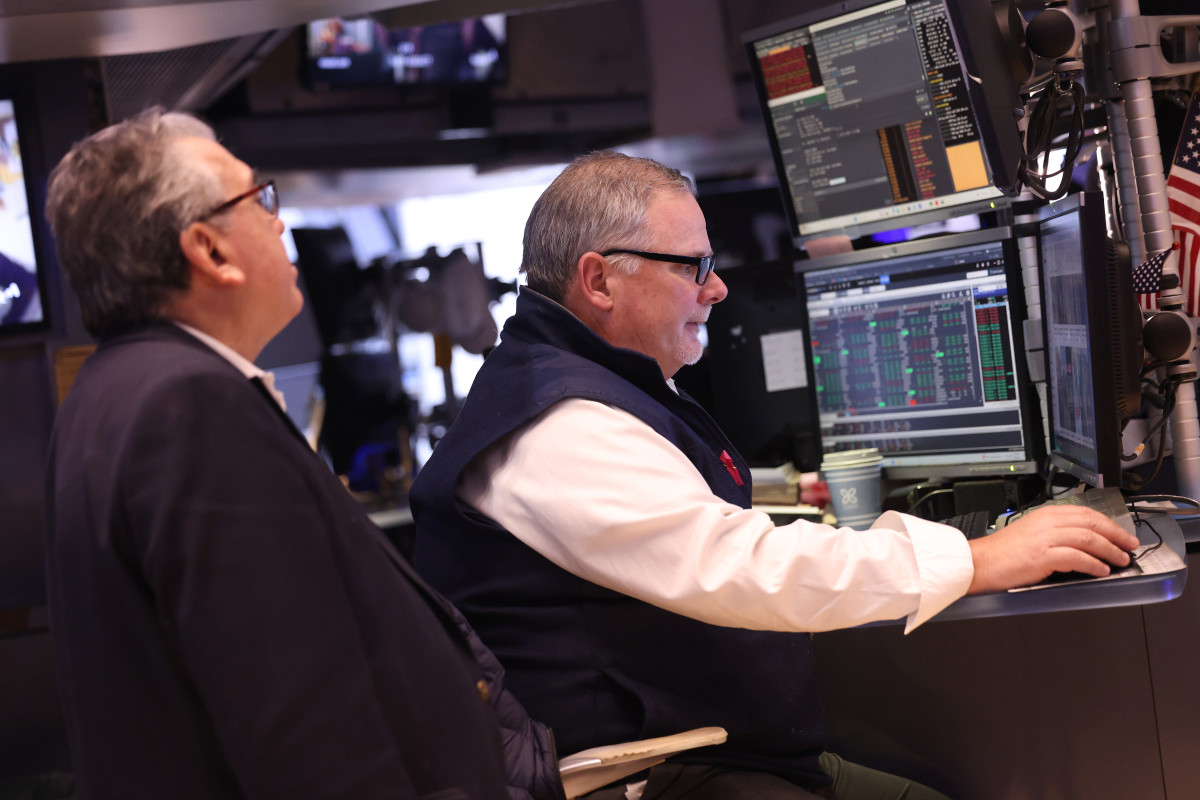
It was startling this past week to see many of the hottest stocks stagger around and then fall down like drunken sailors in a dodgy street.
This is April, after all, and April has been one of the top months for investors since 1950.
But stagger stocks did. The Standard & Poor's 500 Index finished below 5,000 for the first time since Feb. 21. The Nasdaq Composite dropped 5.5%, its worst weekly loss since its 5.65% fall during the week of Oct. 31, 2022.
The Dow Jones Industrial Average ended flat.
Interest rates moved mostly higher, and so did mortgage rates.
And now investors face a big week with some of the first quarter's most important earnings reports due from Tesla (TSLA) , Meta Platforms (META) , Microsoft (MSFT) and Exxon Mobil (XOM) .
Related: Wall Street faces make-or-break week with Tesla, GDP, inflation on deck
Plus two important economic reports: the first look at the U.S. Gross Domestic Product for the first quarter and the March report of the Federal Reserve's favorite inflation measure, the Personal Consumption Expenditures Index.
It sounds dangerous, but here are two bits of good news to consider:
- A big shooting war in the Middle East has NOT erupted.
- Early futures trading on Sunday suggests lower oil prices and hints that a short-term rally in stocks is forming.
The big market challenges, part 1
The shock that professionals and retail investors have been feeling of late starts with this challenge:
The market opened 2024 with most of Wall Street expecting inflation to fall and, with it, multiple interest-rate cuts from the Federal Reserve.
But inflation hasn't fallen enough to satisfy Fed officials, and this past week, Fed Chairman Jerome Powell conceded what market veterans had expected: There may be one rate cut, maybe two in 2024 — if only inflation will cooperate.

The 10-year Treasury yield ended the week at 4.63%, up from 4.53% a week before and up 19% from the 3.88% at the end of 2023.
Mortgage rates had fallen from about 8% in early October to the 6.5% range on a 30-year fixed-rate loan in January, giving hope to home buyers, sellers of existing homes, and small homebuilders. Now, the rate is above 7%. The rising-rate trend hit the recent report on existing home sales.
The big market challenges, part 2
The big tech stocks that have led the big rally since the end of October have lost their mojo as the hype about artificial intelligence has faded.
It feels somewhat like the hype around the Internet in early 2000 and the resulting dot.com bust. Just not as crazy.
Yes, AI is a powerful technology. How that technology gets used — and truly used profitably — by customers is not yet clear.
Nvidia (NVDA) , up nearly 83% in the first quarter, fell 11% last week and is off 15.7% so far in April. Chip designer Arm Holdings (ARM) , up 66.3% in the first quarter, is down 30% just in April.
More on markets
- Netflix’s latest decision frustrates investors
- Crude oil prices whipsaw on Mideast tension after Israel strikes Iran
- Most Day Traders Fail. Here’s Why and What to Do About It
Microsoft, up nearly 12% in the first quarter, is down 5.1% at $399.12 this month. It no longer sports a market capitalization above $3 trillion.
Tesla, up nearly 102% in 2023, has struggled all year with a glutted electric-vehicle market and well-publicized manufacturing problems. It is down 41% year to date.
In fact, the real stress in the market was concentrated in technology, discretionary and communication services stocks. These include Ford (F) , General Motors (GM) , Home Depot (HD) and Starbucks (SBUX) .
Consumer staples, financial and utilities stocks moved higher.
Meanwhile, United Airlines (UAL) was up 22% after a blowout earnings report. Also rising this past week: Goldman Sachs (GS) , up 3.7%, PepsiCo (PEP) , up 3.6%, and Nike (NKE) , 2.8%.
The strength in financial stocks in particular suggests investors aren't that worried about the economy. They are, however, moving money away from technology, wrote market watcher Jon Markman this week.
How to handle this market
Markets move up and down. A 5%-to-10% rundown is a given once or twice in a normal year, defined for our purposes as not battered by a pandemic or something like the 2008-2009 market crash.
The S&P 500, in fact, fell 10.3% between July 31, 2023 and the market bottom of 4,119.37 on Oct. 27, 2023.
The index still finished the year up 24%.
As of April 19, the S&P 500 is down 5.5% from its record close of 5,254.35 reached on Feb. 28.
So the question is how to handle this downturn. And one should start with these questions: Why am I in the market? When do I need the money?
If the answer to the second question is soon, then think about getting some advice to protect yourself.
If you have time, you consider at least three options.
- Move investments around to safe havens like bonds you can hold to maturity. The downside is it entails costs and, more importantly, more risk than you expect.
- Buy into the lower prices. That's a different way to describe dollar-cost averaging. That's a strategy that works with mutual funds and exchange-traded funds. For the same cash, you're getting more shares. And it sets your investments up for a gain when the turn comes.
- Do nothing. Market downturns usually turn around if you have the time to wait. The S&P 500 has weathered two serious selloffs starting in late 2007. It's up 657% since the bottom of the 2008-09 crash.
What's ahead this week
Some 667 public-traded U.S. companies report quarterly reports this week. Of that total, 158 are components of the S&P 500.
The big reports to watch:
Monday (April 22): German software giant SAP (SAP) , telecom giant Verizon (VZ) , and grocery giant Albertsons (ACI) .
Tuesday (April 23): Visa (V) , Tesla, General Electric Aerospace (GE) (the survivor from breaking the old General Electric into three pieces), Texas Instruments (TXN) and United Parcel Service (UPS) .
Wednesday (April 24): Meta Platforms (META) , IBM (IBM) , AT&T (T) and Boeing (BA) .
Thursday (April 25): Microsoft, Google parent Alphabet (GOOG) , T-Mobile (TMUS) , Caterpillar (CAT) , Intel (INTC) and Southwest Airlines (LUV) .
Friday (April 26): Oil giants Exxon Mobil and Chevron (CVX) , pharmaceutical giant AbbVie (ABBV) , Colgate-Palmolive (CL) and Phillips 66 (PSX) .
Related: Veteran fund manager picks favorite stocks for 2024







